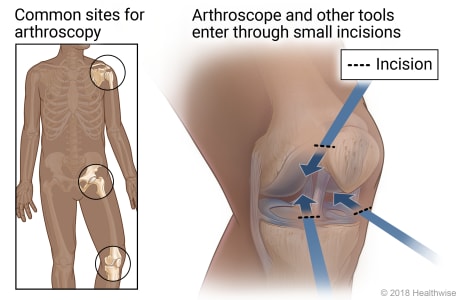Arthroscopic procedure

Arthroscopic surgery (arthroscopy) is a surgical procedure that allows your doctor to look at the inside of a joint in your body through a thin viewing instrument called an arthroscope. Common sites for the procedure include the shoulder, hip, and knee.
During arthroscopy, the arthroscope is inserted into your joint through a small cut (incision) in the skin. The arthroscope has a light source and a video camera attached to it. Images from the camera can be seen on a video monitor. These magnified images provide a clear picture of your joint. A sample of joint tissue can be collected during arthroscopy for biopsy. If surgery is done, additional instruments will be inserted into your joint through other small incisions.
Why is arthroscopic surgery for rheumatoid arthritis done?
This procedure is used for treatment in large joints. Procedures done with arthroscopy include:
- Cleansing and removing debris from the joint (irrigation).
- Removing any free-floating pieces of bone or cartilage from the joint.
- Smoothing out rough or irregular joint surfaces.
- Limited removal of inflamed tissues (synovectomy) in larger joints.
This procedure may not be the right choice if joint destruction is severe.
How is arthroscopic surgery (general) done?
You will be asked to remove any jewelry and to wear a hospital gown. You may be given a sedative shortly before the procedure to help you relax. The skin around your joint may be shaved.
During the procedure
If general or regional anesthesia is used, an anesthesia specialist will give the medicine. A general anesthetic will make you sleep during the procedure. Your heart rate and rhythm, blood pressure, and breathing will be watched closely during the procedure. If a local anesthetic is used, it will be injected into the skin and joint space. If a local or regional anesthetic is used, your limb will be numb. You will be relaxed and drowsy but will be awake.
You probably will lie on your back. Depending on which joint is being looked at, an inflatable band (tourniquet) may be used to briefly restrict blood flow to your joint. This allows your doctor to see all the parts inside your joint. Your joint is scrubbed with an antiseptic solution and draped with sterile towels. Before the tourniquet is inflated, the joint will be raised. It may also be wrapped with an elastic bandage to reduce blood flow to the joint.
A small incision about 0.25 in. (0.6 cm) will be made near your joint. Before the doctor inserts the arthroscope, an irrigation fluid (usually saline) will be used to flush the joint space. This gives the doctor a better view of the entire joint. A steady low flow of fluid is usually used during the procedure. This clears out any debris or blood in the joint so your doctor can evaluate your joint.
After the scope is put in, your doctor will be able to see inside the joint by viewing a video screen attached to the scope. Your doctor or the surgical assistants may bend, extend, and change the position of the joint to see it from different angles. Videotapes or photos of the joint may also be taken.
If more surgery is needed to repair your joint problem, more small incisions will be made. Other thin tools will be put into your joint. When the arthroscope and any other tools are taken out, any blood and debris will be flushed with saline and drained. To reduce swelling or pain, local anesthetics or corticosteroids may be injected into your joint.
The small incision is closed with stitches, skin glue, or tape strips. Depending on which joint was looked at, you may need to use splints, slings, or crutches while you recover from surgery.
How well does arthroscopic surgery for rheumatoid arthritis work?
Arthroscopy temporarily relieves pain and sometimes eases joint movement. But it does little to slow the progression of the disease.
How do you prepare for arthroscopic surgery (general)?
Arthroscopic surgery is often done on an outpatient basis without the need for an overnight stay in a hospital.
You may have more tests, such as blood tests or urine tests, before your procedure.
Be sure you have someone to take you home. Anesthesia and pain medicine will make it unsafe for you to drive or get home on your own.
If you have arthroscopy of your ankle, knee, or hip, your doctor will talk to you about using crutches after the procedure. If you have arthroscopy of a joint in your arm, you will likely wear a sling or splint afterward.
You may need to shower or bathe with a special soap the night before and the morning of your procedure. This may help prevent an infection.
©2011-2025 Healthwise, Incorporated
